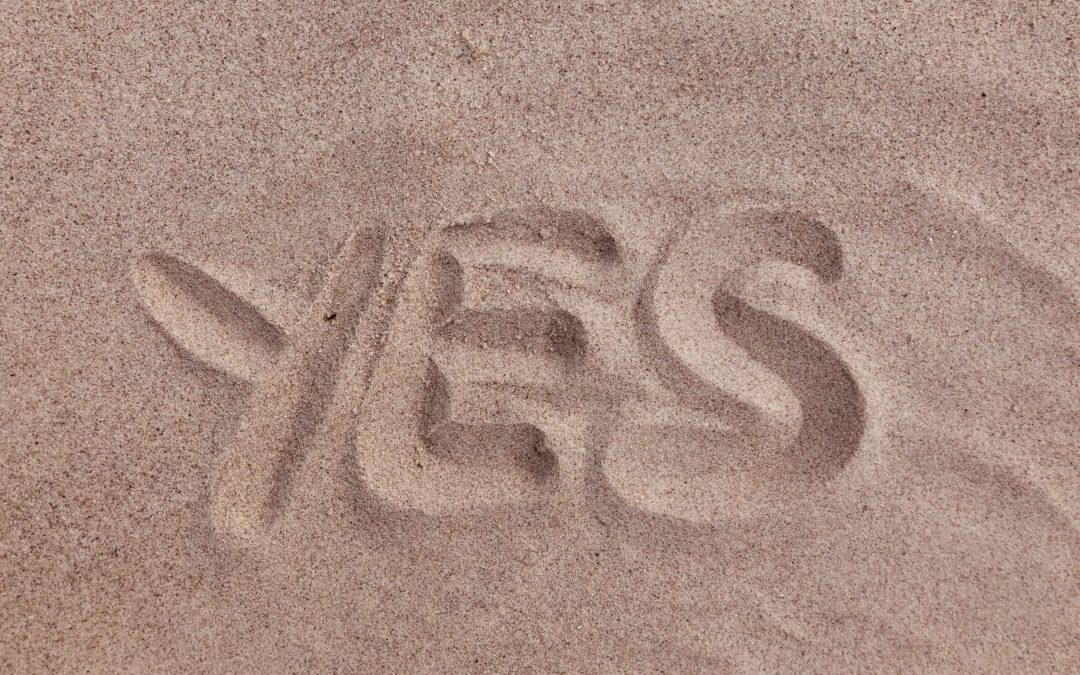- Anti-Racism Tip #8: If It Needs a Disclaimer, Don’t Say It - October 18, 2022
- On Tender Moments that Take Us By Surprise - May 18, 2022
- Finding Creative Ways to Exercise During the Pandemic - April 29, 2022
Would you consider yourself someone who says “yes” or “no” more often?
Recently, I was listening to a podcast where the woman being interviewed talked about the fact that her default answer to everything is “No.” Her justification for this choice is two-fold; first, she argues that it’s easier to change your position into a “Yes” than to switch from “Yes” to “No;” and second, she asserts that starting from a “No” provided her with an opportunity to make sure her priorities came first rather than other people’s priorities.
She provided an example was being invited to a BBQ. She said that she would always answer “No” and then if her and her family would actually go then they could switch their answer and the people who invited them were always happy. Contrast this with saying “Yes” first and then switching to a “No, “ which might cause disappointment.
Sounds pretty logical, doesn’t it?
Well… I totally disagree with this approach.
Being around people who always say “No” to everything is exhausting and frankly, most people don’t like hearing “No” all the time. If I had a friend who always said “No” first, I would stop inviting them to things. And the thing is…I personally don’t want to be known as the type of person who always says “No” to everything.
The “Yes, first” Approach
So I adopt a “yes, first” philosophy.
Now before I go on, I want to highlight an important caveat. This “yes, first” philosophy does not apply in the context of protecting one’s bodily integrity, consenting to sexual activity, or affronts to human dignity. It’s important that we live, model, and teach our children about boundaries that the importance of standing up for ourselves, asserting our needs, and protecting our bodily integrity. By setting these boundaries, we protect ourselves and model how to treat others with respect and dignity. Most importantly, we live and model the important concept of consent, which is essential to all healthy relationships. So with these important exceptions, I’ll continue this “yes, first” discussion.
Let’s go back to the BBQ example… wouldn’t it be better to just be honest about whether you can go to the BBQ or not?
If I were invited to a friend’s BBQ but didn’t know whether I could make it, I would let them know that I have to check if I’m available but will get back to them as soon as I can. I would go home, check my schedule, discuss it with the family and then respond. If I could go I would say “yes”, if not, I would say “no.” Simple, right? And this approach doesn’t require an immediate “No”.
Saying “No” as a first response can be perceived as shutting the door on people’s offers, invitations or requests. And this approach can be linked to a “lack” and “scarcity” mentality. When we feel like we don’t have enough _______ (insert “time”, “money”, “energy”) to do things, we end up closing off important opportunities for connection and deepening our relationships with others.
Now I’m not diminishing the real limits people have in these areas, rather my intention is to highlight the important balance between being realistic and manifesting the life we want. As someone who has suffered from significant fatigue, there were times when I literally did not have enough energy to say: “Yes, first.” In those moments, I always made sure to let people know that I would have loved to attend and would do my best to do so if I were invited again. So this “yes, first” approach has its limits but it’s still an important thing to consider in the context of how we generally approach our lives.
How the “Yes, first” Approach Can Help Deepen Connections
In the last several years, I’ve been prioritizing connection. This means that if a colleague asks if I want to grab a coffee, I’ll go with them. It provides an opportunity for us to get to know each other better and visit outside the formal work environment. It provides an opportunity to deepen relationships. And often the change in scenery supports different kinds of conversations than those that would take place in one of our offices. So adopting a “yes first” approach helps us prioritize relationship-building, community, and connection.
Of course, this approach can really be limited by a need to save money for other things. A wonderful colleague of mine often walks with colleagues to get a coffee rather than getting the coffee for herself. So although she’s not always spending money on coffee, she is always willing to say “yes, first” to connecting with others and getting outside to stretch her legs. Another good friend of mine often emails me to arrange a walk and talk. These tend to happen every month or so and we both get exercise and a 30 minute visit. It’s a great way that we have been able to stay connected over the years.
The “yes, first” approach also supports accepting those invitations to big events – like weddings and birthday parties. I have an unwritten rule that if someone new invites me to something, I always do my best to attend the first time. I want to be known as someone who is reliable, committed and will show up to important events. To put it bluntly, I want to be known as someone who enthusiastically says “yes, first!”
Recently, I was invited by a highly regarded law professor to a gathering of PhD students and professors to discuss Indigenous law issues after work. The first event conflicted with a previous commitment I had. I sent my regrets but assured the law professor that I would do my best to attend the next one. I was then invited to the second event and it fell on a very busy evening for our family – my son had baseball that night and we were leaving for a weekend trip the next day. It certainly wasn’t ideal timing but I wanted to be true to my word and ensure that she knew that I was interested and committed to being a part of this group. So despite the busy timing of the event, I attended. I took the “yes first” approach.
And you know what? It was wonderful.
I met PhD students and law professors who I had only known through their writing. I deepened my connections with those who I had already met at other events and we all had a really great conversation about the ideas we were working through. I left the event reinspired, reinvigorated, and buzzing with new ideas to explore in my academic writing.
There are so many advantages to adopting a “yes, first” approach, others will know that you value spending time with them, they understand that you’ll accept their invitations graciously, and at those moments when you do say “no”, they understand that you’re someone who can be counted on and invited in the future.
The One Week “Yes, first” Challenge
So here’s a one week Challenge that you can consider saying “yes first” to…
For one week, I challenge you to be that kind of person who says: “Yes” first (subject to the caveats above). Whether the situation involves your relationships with family members, kids or colleagues, give it a try.
After you give it a try, post a comment below to let us know if this creates more positivity in your life and deepens your relationships with others.
Looking forward to hearing from you and if you liked this article, share it!
If you enjoyed this article, check out:


Recent Comments